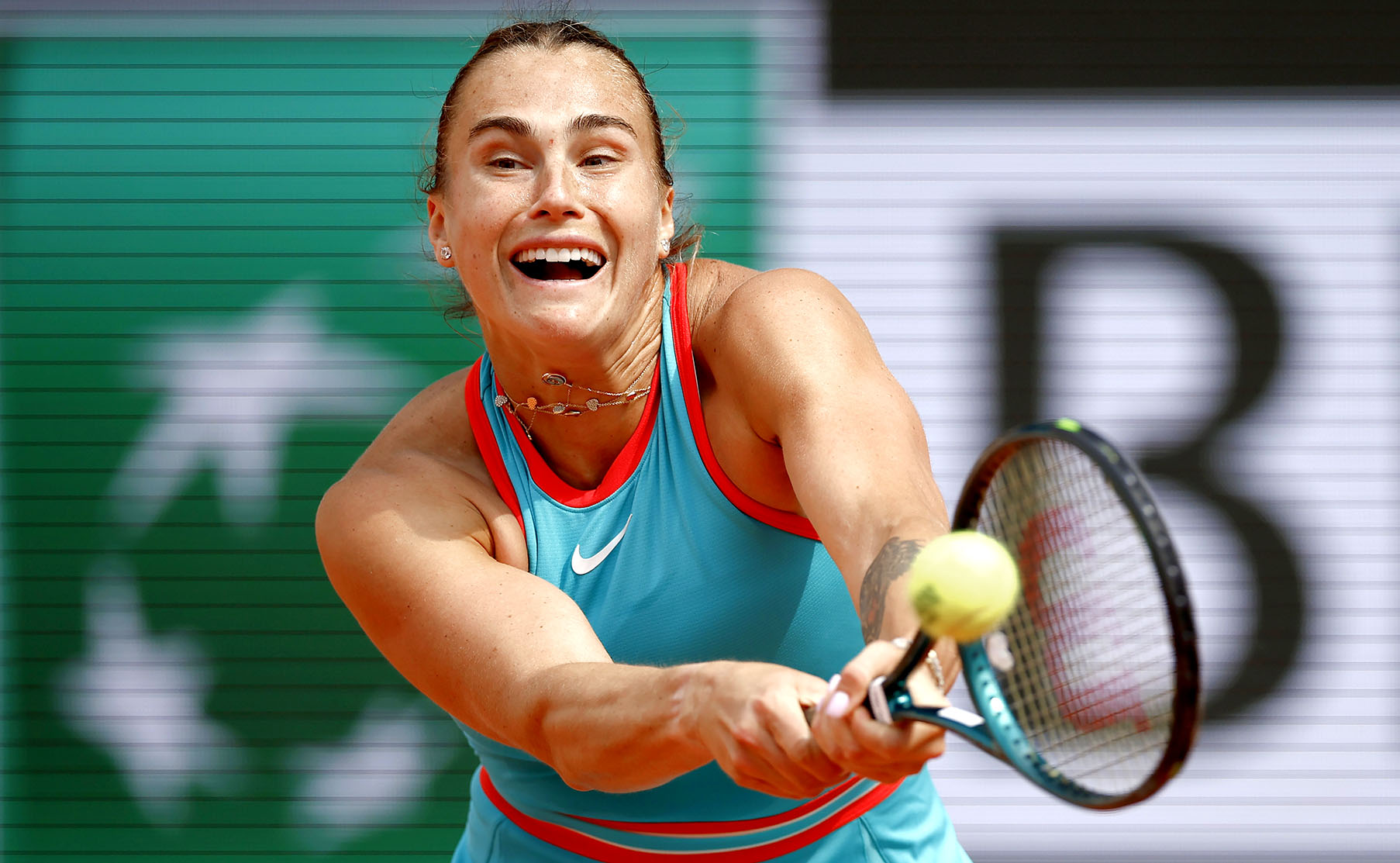The season’s second Grand Slam, the French Open at Roland-Garros, has endured challenging weather and some minor distractions from riots in Paris following Paris St Germain’s victory in the 2025 Champions League final.
These challenges are all in a day’s work for the tournament director Amélie Mauresmo. But the stone in her shoe that won’t go away is the perceived issue of gender bias in the scheduling of matches.
That is to say, top women’s players don’t believe they’re getting as much exposure at prime time as their male counterparts.
Women’s world No 1 Aryna Sabalenka did not feature in an evening session in her first five rounds, when it’s expected that television viewership would be at its peak.
At Roland-Garros, the late morning/afternoon sessions are also poorly attended, with many matches starting in front of empty stands. It’s simply something that doesn’t happen on the major showcourts at Wimbledon, for instance.
The lethargic afternoon attendance has been put down to French cultural practices, such as the enjoyment of a long lunch.
Sabalenka’s 7-6(3) 6-3 quarterfinal win over China’s Zheng Qinwen in the afternoon session on Court Philipe Chatrier, the complex’s biggest arena, started in front of swathes of empty seats.
“We deserve equal treatment,” Sabalenka said following her victory over the 2024 Olympic champion.
“There were a lot of great battles, a lot of great matches, which would be cool to see as a night session (match), just more people in the stands watching these incredible battles and to show ourselves to more people. I definitely agree that we deserve to be put on a bigger stage, like better timing and more people watching.”
Supply and demand?
The arguments against the timing of women’s matches range from “market forces” such as supply and demand to the fact that they are the best of three sets, and not over five sets like the men.
The implication being that fans, paying a premium price for evening session tickets, deserve more for their money.
It’s possible both these reasons are true, so is it a case of reopening the three versus five set debate for women’s tennis? At least at the Grand Slams?
 Amélie Mauresmo, the tournament director of the Roland-Garros tournament. (Photo: Andy Cheung / Getty Images)
Amélie Mauresmo, the tournament director of the Roland-Garros tournament. (Photo: Andy Cheung / Getty Images)
Interestingly, data for the 2024 women’s singles final from Europe, which is played on a Saturday afternoon, showed a 21% viewership increase year-on-year from the 2023 final.
In 2024, Poland’s Iga Swiatek defeated Italy’s Jasmine Paolini in the final. The increased European viewing could be down to the fact that both players represent large European nations.
Is it a chicken and egg situation? By not scheduling women’s matches in prime time, attendance and probably television viewership is inferior to the men’s draw.
Mauresmo defended the situation.
“If we have two (men’s) matches in the night session it doesn’t work in terms of how late players are going to finish,” said Mauresmo in a press conference, explaining that earlier starts would not work as well.
“The stands are going to be empty for most of the first match. That’s what we think. So, we keep this one match in the evening. It’s not ideal.
“We cannot check every box because we have many things to think about when we’re making these choices.
“For me, the message is not changing, and it has never been that the girls are not worthy to play at night. It’s never been this. I’ll not accept that you carry this message. That’s clear to me.”
Not new
Issues with scheduling in Paris are not new. The Women’s Tennis Association (WTA) raised concerns last year after it emerged that only one women’s match was scheduled in the evening session in 2022 and 2023. To compound matters, all 11 evening sessions in 2024 featured men’s matches.
“Fans want to see the excitement and thrill of women's tennis on the biggest stages and in the premium time slots,” The WTA said in a statement last year.
“To continue building the value of our combined product, a balanced match schedule that features both the best in men’s and women’s tennis is critical.”
That clearly hasn’t happened – yet.
Former French Open finalist Ons Jabeur, who is an increasingly vocal voice of social justice over the wars in Gaza and Ukraine to equality for women’s tennis, spoke out on court and on the official WTA channel.
“Frankly, playing a quarter-final at 11am is really such a chore,” Jabeur said following her 4-6 6-2 6-3 defeat by Coco Gauff in 2024.
“We deserve to be here. Playing in the afternoon is better. There is going to be more people watching us and the stadiums are crowded.
“I have a lot to say on that topic (scheduling). Ten night matches without any women playing. I really hope that I can see the contract negotiated with Prime (Video). I really don’t understand the ins and outs, even for men. Playing that late for men after midnight is not a good thing (either).”
 Ons Jabeur of Tunisia. (Photo: EPA-EFE/Christophe Petit Tesson)
Ons Jabeur of Tunisia. (Photo: EPA-EFE/Christophe Petit Tesson)
Jabeur went further with these words on the official WTA channel, posted on 31 May, 2025: “A lot of amazing athletes have been told the same things over and over. That no one watches. That no one cares. That women’s sport doesn’t ‘move people’,” Jabeur wrote.
“Judgement comes quickly, often from those who’ve never even watched a full match. One empty stadium is held up as proof. The packed ones? Conveniently ignored. A missed shot becomes a headline. The hundreds of brilliant ones? Forgotten.
“Still, they show up. Still, they compete. Still, they carry a sport forward on their shoulders.
“When a woman wins 6-0, 6-0, it’s called boring. Too easy. When a man does it? That’s ‘dominance.’ ‘Strength.’ ‘Unstoppable.’
“When women play with power, they’re told they ‘play like men’. As if strength, speed or aggression don’t belong in a woman’s game.
“If they celebrate, they’re dramatic. If they don’t, they’re cold. Too emotional. Too distant. Too loud. Too quiet. Too much. Never just right.
And yet the game keeps rising.” DM




 Ons Jabeur of Tunisia hits a backhand during her Women's 1st round match against Magdalena Frech of Poland at the French Open Grand Slam tennis tournament at Roland Garros in Paris, France, 27 May 2025. EPA-EFE/CHRISTOPHE PETIT TESSON
Ons Jabeur of Tunisia hits a backhand during her Women's 1st round match against Magdalena Frech of Poland at the French Open Grand Slam tennis tournament at Roland Garros in Paris, France, 27 May 2025. EPA-EFE/CHRISTOPHE PETIT TESSON 